#ancient Greek historical fiction
Text
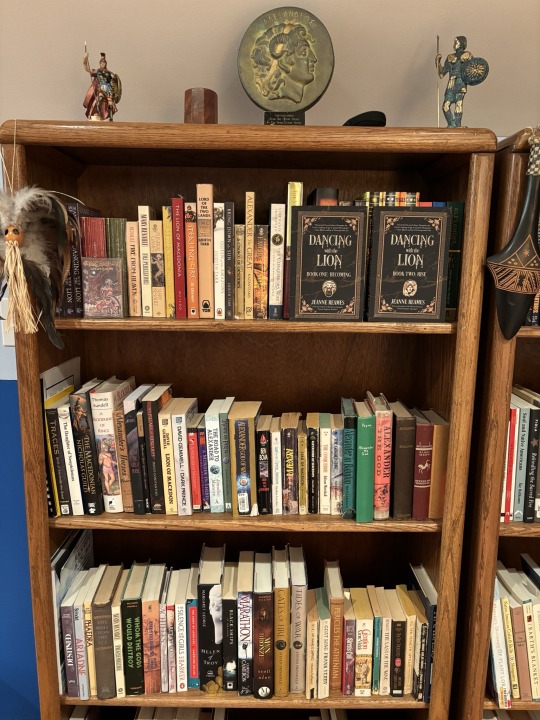
All my ATG fiction, back on shelves. The copies of the new book covers just arrived today. 😊 I forgot to leave room for them. 😂
#Alexander the great in fiction#alexander the great#hephaistion#hephaestion#historical fiction#Alexander the great novels#Ancient Greek historical fiction#dancing with the lion
44 notes
·
View notes
Text
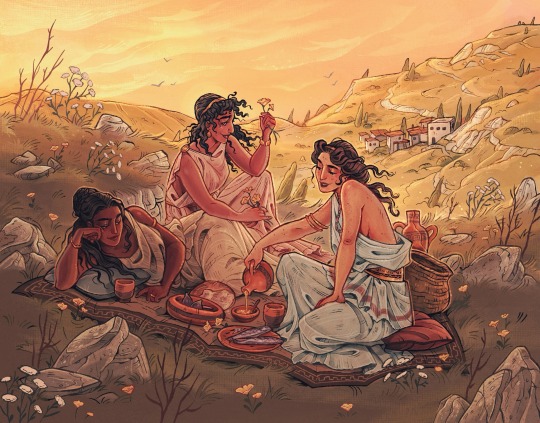
in hills made of coarse earth and honey🏺
✦ find me on instagram @the.flightless.artist ✦
#art#illustration#digital art#drawing#digital illustration#procreate app#digital drawing#digital artist#procreate art#ipad pro#ancient greece#ancient greek art#historical illustration#historical aesthetic#historic fiction#greek aesthetic#oh to be them#greek women#women in art#female friendship
755 notes
·
View notes
Text
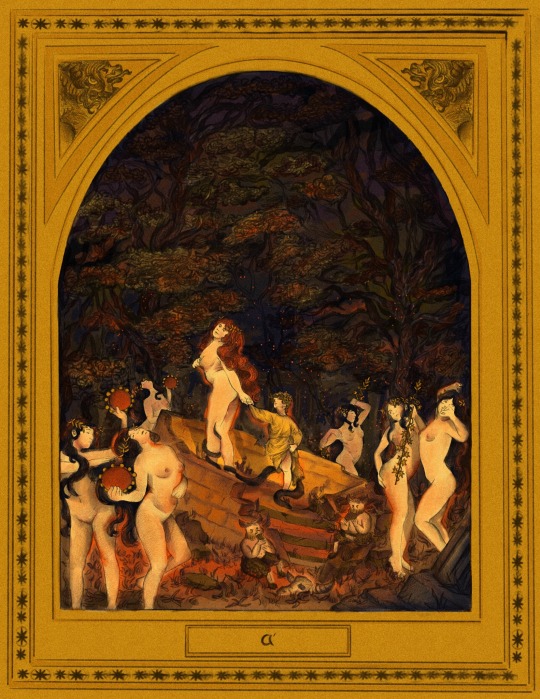
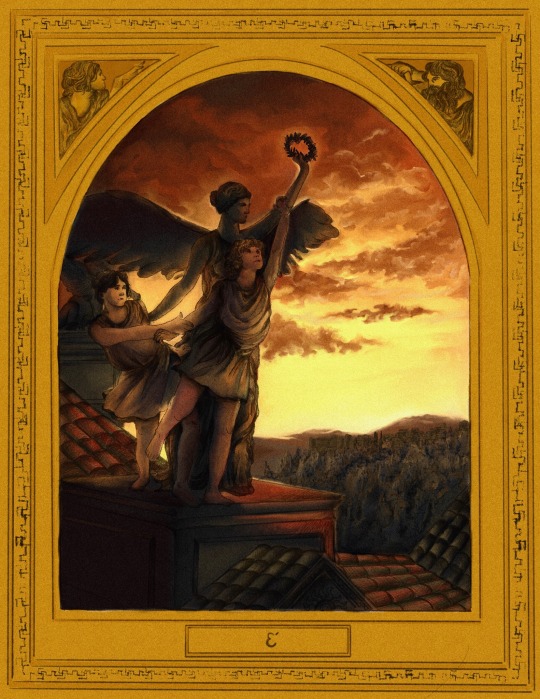

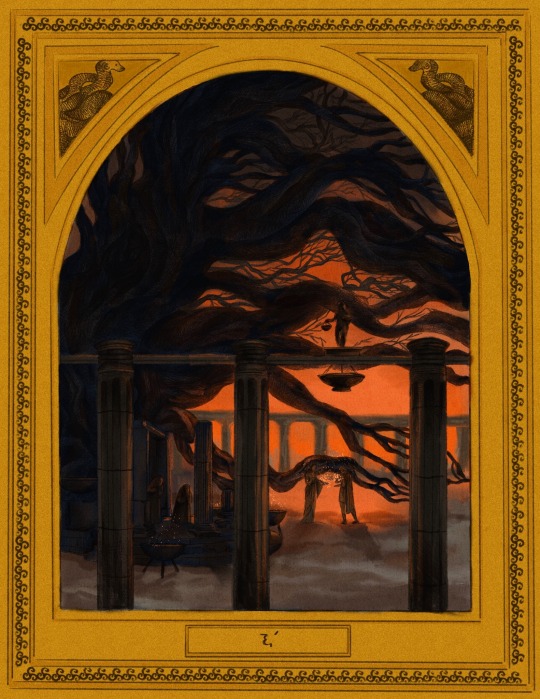
“True friends share everything, except the past before they met.”
― Mary Renault, Fire from Heaven
*Redid my old (not really old, they’re from last year🙄) illustrations on the historical novel “Fire from heaven” which follows a journey of Alexander the Great through childhood to the very end.
#illustration#book illustration#vintage illustration#book art#quotes#vintage#books#ancient greek#ancient art#alexander the great#fire from heaven#adult fiction#historical fiction#hephaistion#ancient aesthetic#fanart#mary renault#macedonia
99 notes
·
View notes
Text
Poll Time!
Friends, I recently thought up a small series of erotic shorts about the (very gay) erotic adventures of a pudgy ancient Greek youth. Would anyone be interested in reading that? 🤔
Reblogs welcome 💖
#tagamemnon#greek myth#greek mythology#ancient Greece#historical fiction#writers on tumblr#tumblr polls#poll time#LGBTQ#LGBTQ reads#gay
7 notes
·
View notes
Text
I just love Natalie Haynes's writing style and storytelling. She makes the Greek gods seem so real.
Athena: "I want a thing. Everyone else has a thing. Or two things. So I also want a thing."
Zeus: "How about an owl, my precious one, my sweet potato, my dearest darling baby girl?"
Athena: "No one else will get an owl?"
Zeus: "No. It will be your special thing, my sugar muffin rainbow doughnut."
Athena: "Cool then. I'll take the owl."
#religious ramblings#hellenic polytheism#hellenic pantheon#ancient greece#greek mythology#deities#historical fiction#bookblr
52 notes
·
View notes
Text
my favourite genre of egyptian people reacting to the cleopatra documentary is others being like “but you didn't have a problem when elizabeth taylor played cleopatra!” and them being like “actually yes, we did, y'all just never give a fuck about what we have to say as long as you make money off our culture”
#cleopatra#man i knew this documentary would be a disaster as soon as i watched the trailer#and i knew racists would have a field day with their hysterics about hOw fAr wiLl iT gO and how this is a ~slippery slope~#like. no its not.#keep racebending to works of fiction and you'll be fine#no serious person would be mad about a cartoon character who's half fish being played by a black woman#also you may consider every once in a while casting people from the culture you're exploiting (ie EGYPTIANS) in your hollywood movies/shows#you know for a change??#i legit can't name a single case of an egyptian playing an ancient egyptian on screen other than rumi malek in night at the museum 😭#and yes i know cleopatra is macedonian but as a greek i think her being played by an egyptian woman would be the most respectful portrayal#given that she's an integral part of egyptian history#and it'd be MUCH closer to historical accuracy than any of her hollywood portrayals so far
20 notes
·
View notes
Text

Support me on Patreon!
Author IG: roselynnthornwood_author
#greek goddess#greek myth#greek mythology#historical fiction#ancient greece#aphrodite#smutty fiction#spicy content#spicy creator
4 notes
·
View notes
Text
Are you a history student looking for a political thriller with a dash of dangerous romance and endless twists? Read:
#alternate history#historical fantasy#historical fiction#ancient history#history#ancient rome#roman mythology#greek myth#new adult books#new books#fantasy books#fantasy#urban fantasy#ya books#ya fantasy#ya fiction#book reccs#book recommendations#lord of the rings#lotr#star wars#acotar#throne of glass#game of thrones#roman republic#roman empire#history stuff#history student#history shitposting#archaeology
2 notes
·
View notes
Text
Sword Through the Heart - A Greek Romance
Chapter Two: Beneath the Surface
As the battle continued to rage around them, Themistocles and Leonidas found themselves locked in a tense stalemate. Their swords moved with a fluid precision, the clash of steel reverberating through the air as their eyes remained locked in an unrelenting challenge.
Their movements were calculated, each one a testament to years of training and experience. Leonidas' shield bore the scars of countless battles, while Themistocles' armor was adorned with the marks of his strategic prowess. It was a deadly dance, a struggle for dominance that transcended the battlefield.
Amidst the intensity of combat, a sudden lull provided a temporary respite. Their chests heaved with exertion, and their eyes bore a glint of mutual exhaustion. For a moment, they stood facing each other, a silent acknowledgment of the raw power that crackled in the air.
"Tell me, Themistocles," Leonidas said, his voice gruff as he wiped sweat from his brow. "What drives a man like you to stand against the might of Sparta?"
Themistocles' gaze held a hint of intrigue, a glimpse into the complex web of his motivations. "I fight for the vision of a united Greece, a land free from constant strife."
Leonidas' brows furrowed, a mix of skepticism and curiosity in his expression. "And do you truly believe that's attainable?"
Themistocles' voice was tinged with a touch of earnestness. "I do. I've seen the power of unity in the face of danger. We could achieve greatness together."
Their conversation was a strange interlude in the midst of battle—a momentary escape from the bloodshed that surrounded them. There was an odd connection forming, an understanding that their rivalry was built on more than just blind hatred.
The distant sound of a horn echoed through the air, signaling a temporary ceasefire as both armies retreated to regroup. In the stillness that followed, Themistocles and Leonidas found themselves standing side by side, the weight of their weapons no longer a barrier between them.
"I never thought I'd find common ground with a Spartan," Themistocles admitted, a trace of bemusement in his voice.
Leonidas grunted, a hint of a wry smile playing on his lips. "War has a way of forging unlikely alliances."
As the sun dipped lower, casting long shadows that stretched across the battlefield, the two rivals shared a moment of camaraderie—an understanding that beneath the armor and the enmity, they were both men driven by conviction. And as the ceasefire ended and the battle resumed, their blades clashed once more, each strike a testament to the complexity of their relationship.
#greek#greek mythology#greek story#themistocles#leonidas#romance#greek romance#writers#for funsies#love#gay#mlm#greek mlm#ancient mlm#history#historic#historic fiction#idk#themistocles x leonidas
4 notes
·
View notes
Note
How do you anticipate Alexandros’s and Hephaistion’s respective ways of dealing with each other in their “moments” to change over the course of your series? I think you pretty clearly established in your books that Hephaistion has to learn to carefully navigate Alexandros’s outbursts and spontaneous tendencies.
On the flip side, I wonder how Alexandros learns how to deal when Hep is angry or upset. Do you think it being more so along the lines of him expecting Hep to suck it up and deal, basically? Or would he take a different route? I just find the way you portrayed their dynamic in the series very intriguing and nuanced, and I'm curious to see how it might evolve as the characters age.
What an interesting question! And I’m delighted that you thought their interaction properly nuanced. One of my own personal criteria for judging a book is the presence of layered and complex characters, so I struggle to put them on the page in my own work. (Also, sorry for the delay.)
Among the key elements of the first two books is how much the characters change. It covers seven critical years as they turn from boys into young men. Hence the whole “coming-of-age” thing. Ha.
Because they’re teenagers, they’re inclined to drama, especially in the first book where little things can set them off—but it happens early in book II as well. Hephaistion flails and causes a scene just because Alexandros is busy so often and he, Hephaistion, is insecure. His behavior is silly (and Alexandros calls him on it), but the emotions that drive it are very real. That’s always the struggle, when writing teens. They just haven’t lived long enough for much perspective, so everything’s a crisis. Emotions are BIG, driven by wildly pumping hormones and all those extra neurons in the front of the cerebrum. Yet the author must take seriously whatever tempest in a teapot has them riled up, in order to portray it fairly (for them), even while keeping a bit of distance to signal to the reader that yes, it really is overblown.
By the duology’s end, Alexandros has just turned 20 and Hephaistion 22½; they’ve been friends seven years, and lovers for five. By now, they have history. Yet both are emotional people, even if they display it differently. Hephaistion might seem phlegmatic but is far from it. Erigyios is phlegmatic. Hephaistion is a churning volcano under a calm surface. Alexandros, by contrast, wears his heart on his sleeve. So, they’ll continue to kick up dusk occasionally with each other, but increasingly for real reasons, not manufactured ones driven by insecurity.
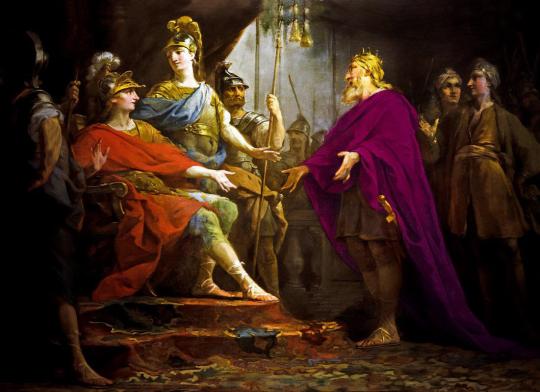
Take their fracture over the fact Alexandros didn’t tell Hephaistion about Amyntor’s illness. They learn, thereby, that some things can be forgiven only by a choice. Hephaistion’s flouncing over Alexandros “ignoring” him at the beginning of book 2 should be seen in stark contrast to the very real rage he feels when he learns Alexandros concealed his father’s cancer. Yes, Alexandros did so because Amyntor asked, and yes, Alexandros convinced himself it was out of fear for Hephaistion’s safety. But he does finally recognize, and admit to himself, that wasn’t the real reason. He did a truly selfish thing by keeping Hephaistion with him. Hephaistion’s reaction in each instance is meant to bookend the novel. In the first case, he storms back home. In the second, despite his fury, he doesn’t leave Alexandros. And Alexandros accepts Philip’s pardon not just because he knows he’d better, but also because Hephaistion needs to go back. It’s a maturing moment for Alexandros to fully recognize how much he hurt his friend. He can’t fix it. He can only beg for forgiveness. Hephaistion won’t get back those final months with Amyntor. He can only choose to forgive.
So, the sequence is (to my mind) incredibly important to how they’re learning to be Real with each other. And it lays out how they’ll continue to interact going forward.
Alexandros will still screw up sometimes, in part because he’s king and was raised to assume people will subject themselves to him, as well as because his successes convince him the gods are on his side. But it was always Hephaistion’s refusal to kowtow that made him attractive to Alexandros. Ergo, he must make room for that in their relationship. It’s what makes Hephaistion unique.
In book one, after their physical fight over a different dust-up, Alexandros thinks to himself that the fact Hephaistion was willing to hit a prince had earned him the right to hold one. Alexandros must allow for Hephaistion’s autonomy, which means he must apologize (honestly) now and then. It’s what keeps him human, and grounded. And why Hephaistion continues to enjoy such absolute trust. He expects Alexandros to acknowledge when he screws up, and so Alexandros can trust that Hephaistion will always tell him the truth. Because Hephaistion loves him that much.
#asks#Alexander the Great#Hephaistion#Hephaestion#Dancing with the Lion#DwtL#alexander x hephaestion#Alexander x hephaistion#writing complex characters#historical fiction#ancient Greek historical fiction#Classics
27 notes
·
View notes
Text
‘On the day of my birth, my father’s younger brother, Alexias, died in his twenty-fourth year. He, hearing that a youth called Philon, with whom he was in love, had been taken sick, went at once to him; meeting, I have been told, not only the slaves but the boy’s own sister, running the other way. His father and mother had already perished; Alexias found the lad alone, lying in the basin of the courtyard fountain, where he had crawled to cool his fever. He had not called out to anyone to fetch his friend, not wishing to endanger him; but some passers-by, who had not cared to go very near, reported that they had seen Alexias carrying him indoors. This reached my father after some time, while my mother was in labour with me. He sent over a reliable servant who had had the plague already; who, however, found both the young men dead. From the way they were lying, it seems that in the hour of Philon’s death, Alexias had felt himself sicken; and, knowing the end, had taken hemlock, so that they should make the journey together. The cup was standing on the floor beside him; he had tipped out the dregs, and written PHILON with his finger, as one does after supper in the last of the wine.’
- Mary Renault, Last of the Wine
3 notes
·
View notes
Text
Beautiful Quotes from The Song of Achilles by Madeline Miller
“I could recognize him by touch alone, by smell; I would know him blind, by the way his breaths came and his feet struck the earth. I would know him in death, at the end of the world.”
“And perhaps it is the greater grief, after all, to be left on earth when another is gone.”
“He is half of my soul, as the poets say.”
“I am made of memories.”
“He is a weapon, a killer. Do not forget it. You can use a spear as a walking stick, but that will not change its nature.”
“He smiled, and his face was like the sun.”
“I will never leave him. It will be this, always, for as long as he will let me.”
“In the darkness, two shadows, reaching through the hopeless, heavy dusk. Their hands meet, and light spills in a flood like a hundred golden urns pouring out of the sun.”
“Bring him back to me."
#historical fiction#fantasy#fiction#mythology#romance#story#love story#love#madeline miller#achilles#patroclus#odysseus#hector#troy#chiron#greece#ancient greece#greek mythology
12 notes
·
View notes
Text
Poseidon’s Atlantis Adventure – The Human Hybrid Experiment
5 Star Review
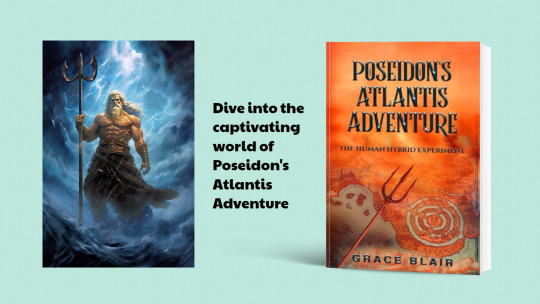
DEC 29
Posted by Literary Titan
Poseidon’s Atlantis Adventure by Grace Blair marks an ambitious beginning to her Atlantis series, seamlessly weaving science fiction elements into the rich tapestry of Greek mythology. This novel, the first in the series, presents an imaginative twist on the classic Titanomachy, offering readers an alternative perspective through the eyes of Poseidon as he battles alongside his siblings in the quest for dominion.
Blair’s narrative commences with a fresh take on this mythological war, culminating in Poseidon’s reign over the seas. At the same time, Zeus and Hades govern the land, skies, and the underworld, respectively. The story then diverges from traditional mythology, depicting a restless Poseidon who yearns to escape Zeus’s shadow. His journey leads him to the enigmatic Atlantis and to Cleito, who reveals unexpected truths, propelling Poseidon into a saga of time travel, confronting ancient evils, and exploring futuristic technologies beyond the imagination of the gods.
Blair’s nuanced portrayal of Poseidon is one of the novel’s most commendable aspects. Turning an omnipotent deity into a relatable character is no small feat, yet Blair achieves this by highlighting Poseidon’s imperfections and vulnerabilities. Finding himself in the advanced civilization of Atlantis, Poseidon must navigate this new world with the assistance of mortals, providing an intriguing contrast to his divine status. The narrative delves into thought-provoking themes, particularly the ethical complexities of advanced technology, such as genetic engineering and human hybridization. Blair does not avoid the moral ramifications of these advancements, adding a layer of depth to the story. The inclusion of spiritual elements, epitomized by the character Lucus and his teachings of “The Way,” further enriches the narrative.
Poseidon’s Atlantis Adventure will particularly resonate with Greek mythology and science fiction enthusiasts. Blair’s skillful pacing and immersive writing style invite readers into a world of wonder, underscored by her evident passion and extensive research into Greek myths. The anticipation for the second installment in the series is palpable, given the strong foundation laid in this opening novel.
Pages: 156 | ASIN : B0CMKG3832
#greek gods#greek mythology#ancient greek#greek tumblr#greek posts#ancient greece#atlantis the lost empire#visions of atlantis#dna#star people#book review#book recommendations#book reading#historical#fantasy#fiction#novella#young adult#author#self publishing
1 note
·
View note
Text
Three is set in Ancient Sparta. It follows a trio of helots who are on the run from a band of 300 Spartan warriors. This is my review.

Three takes place in Ancient Sparta in the year 364 BC. It follows three helots names Klaros, Damar and Trepander. They manage to survive as well as three helots can; each day's being its own small blessing. One night, after their master Eurytos forces them and their fellow helots to get drunk and dance for his amusement, they kill their master and his Spartiates in revenge for massacring their fellow helots. Now the three helots are on the run. Danger lurks around every corner as they are pursued by their master's son, Nestos, and a band of 300 Spartan warriors.
So yeah, this comic is, in many ways, intended to be the antithesis to Frank Miller's (in)famous comic-turned-movie 300. Kieron Gillen said that he was inspired to write this comic because he found 300 to be hypocritical, with how the Spartans bragged about fighting for freedom, and yet kept slaves. From the very first pages we get a sense of this. We begin with some helots picking olives, but then they're massacred by Spartans as part of the Krypteia. Krypteia was an annual festival where Spartans were allowed to kill helots just for fun. The Spartans did this to cull the helots, and prevent and slave revolts or other uprisings. It also did a lovely job of keeping the helots in constant fear.
I suppose I ought to explain what helots are. Helots were slaves who did all of the agricultural work, and other undesirable jobs, in Sparta. To say that it sucked to be a helot would be a massive understatement. Besides the Krypteia, there were several other ways to be killed. For example, when young Spartans trained to be warriors they had a final exam to take. However, if they successfully murdered a helot they automatically passed the final exam.
You don't really see many historical fiction comics, at least in America; it's a different story in France and Japan. So, this comic was quite a treat, and there's a very strong commitment to historical accuracy. At the end of the comic there are several pages devoted to explaining the reasoning behind different panels of the comic, and the historical research behind them. There's also an extended conversation with a professor of Classical Antiquity who specializes in the study of Sparta.
Even without all of that you can just feel that there was a lot of time, love and research put into this comic. For example, at one point our trio of helots stop by a statue of Aphrodite, who is carrying a spear, and Trepander remarks that even the gods follow the insane way of life in Sparta. The Spartans did indeed worship Aphrodite. Ares was, unsurprisingly, Sparta's favorite god, but they did worship other gods. Aphrodite is often depicted as Ares' lover, and you could make an argument that love and war spring from the same sorts of passions and emotions. Also, all of the statues are depicted as fully painted in full color, just as they would have been in Ancient Greece.
Another point of note is when we met Nestos' mother Gyrtias. She's shown to clearly be the one in charge of the family plantation, especially after Eurytos is killed. Women in Sparta enjoyed quite a bit more freedom than most of the other city-states of Ancient Greece. They managed the farms and estates while the men were off fighting wars and waging battles.
Then there's the armor the Spartans wear. Nine times out of ten, when you see Ancient Greek helmets they tend to be Corinthian helmets. Corinthian helmets were the ones that covered almost all of the face, and often had plumes on the top. Those appear here, but they're always shown to be older, more antiqued armor inherited from previous generations. The overwhelming majority of the Spartan warriors wear opened-face conical pilos helmets; which is what most Spartans wore at the time of the story.
Overall, the way that Sparta feels in this comic is a nation past its prime. It's been almost 100 years since the famous Battle of Thermopylae. Sparta's glory days are behind it, and everyone in positions of power are keenly aware of this. That's why 300 warriors are sent after the three helots. Even a rebellion that small could have major ramifications for Sparta's waning way of life.
Have you read Three? If so, what did you think?
Link to the full review on my blog: http://drakoniandgriffalco.blogspot.com/2018/09/comic-review-three.html?m=1
#Three#Three Comic#Sparta#Ancient Sparta#historical fiction#historical comics#comics review#comics#graphic novel review#graphic novels#graphic novel#review#ancient greece#Greece#Ancient Greek#Ancient Greeks#Spartans#Helots#Kieron Gillen#Kieron Gillen’s Three#Image#image comics
0 notes
Text
Updates to AO3 "Mythology" Fandoms
Hi AO3 users! You may have noticed that recently, fandoms previously canonized as "Mythology" are being updated to "Religion & Lore". This renaming project is part of a wider ongoing process on AO3 about respectful treatment and naming of various religions, spiritual beliefs, faiths, and collections of folklores belonging to a particular religious or cultural tradition. This includes both major and minor religions, as well as reconstructionist, ancient, and modern religions.
In the coming months, the term "Mythology" is being phased out of canonical fandom names. This is because of its potential for use as a disparaging term, and the way in which it is used primarily for religions which are already under-represented. Since "mythology" has connotations of being fictional or inferior to the religious beliefs of the speaker or writer, and is unfortunately used in this way by some, the decision has been made to replace this term with something that the Wrangling Committee believes is more inclusive and less derogatory.
After extensive discussion between individuals from varying religious backgrounds and beliefs, including wranglers representing the various fandoms which were being covered, it was felt that "Religion & Lore" was an appropriate and neutral way to describe the bodies of faith, belief, knowledge, and tradition associated with many of these religions which were ancestrally imparted and regional in nature. It is also hoped that this will decrease ambiguous or confused use, allowing people to more accurately describe their works and find works in which they are interested moving forward.
The use of "Ancient" in many of these fandoms' names reflects that these countries still exist but now have different predominant religions or spiritual beliefs. For example, Ancient Greek Religion & Lore (as Greece is now a predominantly Christian country) or Ancient Egyptian Religion (as Egypt is now a predominantly Muslim country). Because "Norse" does not refer to an extant country, region, or culture, it is not necessary to specify that it is historical or ancient in nature.
The names of these fandoms will also have the native language piped, if the English-language demonym is significantly different from the native-language demonym or if there is a culturally specific term based on consultation with individuals who speak these languages as a first language. We hope to give representation to the language of the source culture by doing so.
Each of these changes has been and will continue to be carefully researched and discussed with traditional knowledge keepers and researchers from the cultures represented in the fandoms under discussion.
Many religions face the issue of texts being written long after their events occurred. Unfortunately this is something which is shared across many religious fandoms; AO3 seeks to treat these religious fandoms equally. Care has been taken in researching characters relating to these fandoms, and character tags will be canonized or made a synonym on a case-by-case basis. Fandom tags that are currently synned to the Ancient religious fandoms have been checked as thoroughly as possible to ensure that they are not referring to modern folk tales, and where possible such relatively modern folk tales are canonized as their own fandoms.
(From time to time, ao3org posts announcements of recent or upcoming wrangling changes on behalf of the Tag Wrangling Committee.)
5K notes
·
View notes
Text

Clytemnestra
Debuts: March 7, 2023
Publisher: Sourcebooks Landmark
Rating: ⭐⭐⭐⭐⭐/5
Clytemnestra is a story about a Spartan woman from her teenage years as being young and a bit naive, to her adult years where she is rife with grief, anger, and revenge. It is an origin story of villainy. Clytemnestra, begins with the Spartan being of age to marry and choosing her husband, who is different from any of the Spartan men she grew up with. It tells a story of love and happiness, though brief. From there, it dives into intense stifling grief and hatred. Having endured the worst, Clytemnestra begins to let vengeance take root in her heart, and this changes her from the Spartan woman that people revered and loved, to a Spartan woman that people feared. Again, Clytemnestra experiences an intensely troubling test of internal strength, when again she loses what she loves the most. This further and more completely pushes her into villainy (to those on the outside), and begins the story of the ultimate revenge.
The plot of this story did have a couple of loose ends at the ending, but that would leave more room to continue with a sequel. Like what happened to Helen and Menelaus? What of Timandra and Crysanthe or Timandra and her husband? What about Clytemnestra and Aegisthus? Does Electra ever come back 'round? What of Clytemnestra's youngest daughters and their Servant, Aileen? What eventually happens to Odysseus in regard to Clytemnestra, if anything? Does Clytemnestra avenge her family and take out everyone who was involved, or does she become just like Agamemnon and rule with fear, taking anything she wants? I have so many questions!
This story was captivating from the beginning. I found myself wanting to come back to this book, even though I had to do other things (like work, ew). On my breaks, I would open this book and dive right back in, because the story of Clytemnestra (a Greek myth that I am not at all familiar with), sang to something within me-- having experienced something similar on a lesser scale. This book is also one that is easy to fall into, but hard to get out of, because it reads like a YA novel in ease and pace.
I think that once this book comes out, I'll have to purchase it for the cover, as it is absolutely stunning to me. I also want to have this on my shelf, just in case I want to annotate-- which is not something I have ever done with a book, but this one definitely has all the goodies of a good book to annotate.
#Greek Mythology#Retelling#book#bookstagram#bookblr#books and reading#reading#ARC#Advanced reader copy#book review#historical fiction#ancient historical fiction#adult fiction
1 note
·
View note